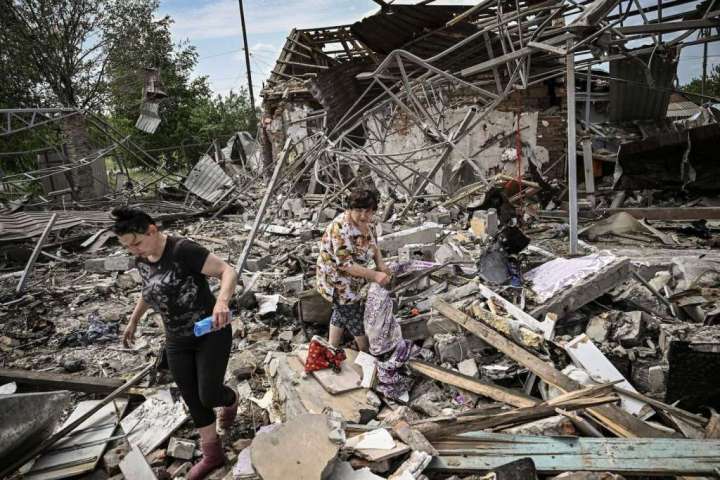“Limited war requires limits,” wrote Harvard professor Thomas Schelling in his 1960 classic, “The Strategy of Conflict.” President Biden took some sensible steps this week in defining the West’s goals for the war in Ukraine — and its limits.
Biden hunkers down for a long, limited war in Ukraine

To check recent Russian advances in eastern Ukraine, Biden is sending a powerful rocket artillery system known as Himars, which can attack Russian targets with the devastating impact of a precision airstrike. But he clarified that the purpose of these American weapons was not only to help Ukraine on the battlefield but also to achieve “the strongest possible position at the negotiating table.”
Biden had a very specific set of messages for Russian President Vladimir Putin: “We do not seek a war between NATO and Russia. As much as I disagree with Mr. Putin, and find his actions an outrage, the United States will not try to bring about his ouster in Moscow. … We do not want to prolong the war just to inflict pain on Russia.” As for the Himars missiles, Biden made clear that “we are not encouraging or enabling Ukraine to strike beyond its borders.”
Follow David Ignatius‘s opinions
FollowThese messages, reinforced in background briefings this week by senior administration officials, signal a change of tone in the Washington debate about the war. An easy triumphalism developed after Russia’s reversals in the first month of the war. Putin and his inept commanders had blundered; brave Ukrainian forces were pushing back the invaders toward the Russian border; Zelensky talked (though he probably knew better) as if total military victory were possible.
On Thursday, however, Zelensky offered a chilling summary of Russia’s advances since it concentrated its forces in the eastern region known as Donbas and began raining down rocket and artillery fire along what Zelensky described as a 600-mile front. “The Russian army has already destroyed almost the entire Donbas,” Zelensky said in a video speech to the Luxembourg parliament. “As of today, about 20 percent of our territory is under the control of the occupiers.”
The Biden White House has been reckoning with the new success of Russia’s meat-grinder tactics for the past week. This has been Biden’s testing hour as a wartime leader; he had reaped well-deserved praise for mobilizing the coalition to arm Ukraine and check Russia’s invasion; now comes the time of reversal in battle and presidential anxiety.
Biden’s most urgent task has been to check a panicked rush for peace among some European allies who worry about the costs of a protracted conflict. European leaders seemed to steady themselves this week by committing to an embargo of Russian seaborne oil deliveries while Germany agreed to provide Ukraine powerful antiaircraft defenses and tanks.
The war in Ukraine, with its vicious swings in momentum, might be moving from ebullient optimism about Ukraine’s defiance toward a phase that’s closer to the long, enervating grind of the Korean War. David Halberstam, in his 2007 history, “The Coldest Winter: America and The Korean War,” described it as “a puzzling, gray, very distant conflict, a war that went on and on and on, seemingly without hope or resolution.”
Korea was frustrating in part because, like Ukraine, it was a limited war. Gen. Douglas MacArthur, the commander, wanted to redeem his early blunders by using nuclear weapons. President Harry S. Truman wisely refused and fired MacArthur. American troops were bitter that they were being asked to “die for a tie,” Halberstam wrote. But military victory wasn’t possible at an acceptable cost, and Republican presidential candidate Dwight D. Eisenhower promised, “I will go to Korea,” which meant that he would make peace. And he did.
The Korea cease-fire in July 1953 must have seemed to many Americans and their brave South Korean allies like a defeat. But today, South Korea is one of the economic jewels of the world — even though the war never yielded a peace agreement and there’s a still fragile cease-fire line nearly 70 years later with a poisonous neighbor to the north. Maybe that’s a snapshot of postwar Ukraine.
Rick Atkinson, a leading military historian, tells me he sees an analogy between the ebbs and flows of the Ukraine conflict and America’s Revolutionary War. British aggressors got pounded in 1775 after attacking Lexington and Concord and then again at Bunker Hill. But the war became a brutal eight-year stalemate, and the American rebels eventually triumphed mainly because of British weariness and French intervention.
“War usually comes down to which belligerent evinces the superior will,” argues Atkinson. “In this case, stalemate will give Ukraine time, at a terrible cost, to determine if it has the will to outlast the Russians until politically acceptable terms emerge. Meanwhile we can hope that Russia is severely reduced as a threat and as a global player.”
Biden rightly insists that only Ukrainians, who have fought and died so bravely, can decide how this war should end. But this week, he expanded what the strategist Schelling called “implicit bargaining” with Russia by marking the contours of the war. At some point, after the butcher’s bill is paid, we’ll move into explicit negotiations to resolve this terrible conflict.






